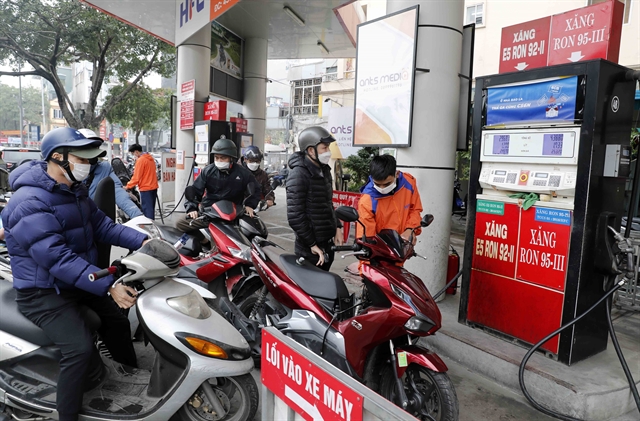 Economy
Economy

 |
| People line up at a gas station in Hà Nội. VNA/VNS Photo |
HÀ NỘI The Prime Minister has instructed the Ministry of Industry and Trade (MoIT) to ensure the nation's fuel supply in 2024.
According to the MoIT, Việt Nam's estimated fuel demand for this year was 28.42 million cubic metres/metric tonnes, maintaining an upward trend observed in recent years.
According to Minister Nguyễn Hồng Diên, MoIT's top priority this year is to ensure a robust supply of petroleum for production, business, and consumption by the public and enterprises.
Phan Văn Chính, head of the MoIT's Domestic Market Department, said the total import, domestically produced, and refined petroleum sources for 2023 were estimated at 26.02 million cubic metres/metric tonnes, with approximately 10.2 million imported.
Diên said last year's failures to follow the ministry's fuel distributing plan and legal requirements had resulted in sporadic shortages across the country. Inspection, examination, and handling of violations in the petroleum industry were not effective in some areas.
The ministry, this year, will be focusing on maintaining minimum trade reserves, fulfilling tax obligations, and effectively managing and utilising fuel stabilisation funds. Considering the anticipated challenges for the global economy, including trade tension, geopolitical issues, and economic and financial crises occurring worldwide, the minister stressed the necessity for contingency plans to help achieve the ministry's objectives in any situation.
Meanwhile, domestic demand for fuel will likely continue to increase.
"It is important we plan beyond annual demand cycles to cover monthly and quarterly intervals as well," Diên said, adding that as long as the industry's major players strictly adhere to the directives of the Government and the Prime Minister's Office, there shouldn't be any fuel shortage this year.
However, measures must be taken to ensure compliance with regulations on the application of management software to ensure objectivity and transparency, as well as the issuance of electronic invoices in the industry according to the Government's decree and the guidance of the Ministry of Finance.
In addition, implementation of the allocated total minimum petroleum supply, with plans for monthly and quarterly deployment, will play a crucial role. Fuel retailers, based on recorded activity levels, should actively provide feedback and propose policy mechanisms or situation-specific solutions to effectively navigate unusual market developments in the petroleum sector.
In a recent MoIT meeting with large fuel retailers and traders, the minister asked them to form contingency plans to ensure adequate supply to meet market demands and allocate sufficient manpower to meet demand during the Tết (Lunar New Year). VNS